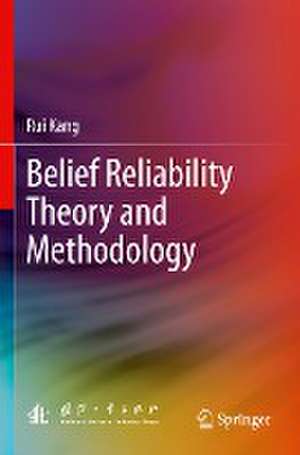Belief Reliability Theory and Methodology
Autor Rui Kang Traducere de Qingyuan Zhangen Limba Engleză Paperback – 2 iul 2022
| Toate formatele și edițiile | Preț | Express |
|---|---|---|
| Paperback (1) | 1103.31 lei 6-8 săpt. | |
| Springer Nature Singapore – 2 iul 2022 | 1103.31 lei 6-8 săpt. | |
| Hardback (1) | 1109.29 lei 6-8 săpt. | |
| Springer Nature Singapore – iul 2021 | 1109.29 lei 6-8 săpt. |
Preț: 1103.31 lei
Preț vechi: 1345.50 lei
-18% Nou
Puncte Express: 1655
Preț estimativ în valută:
211.12€ • 219.99$ • 174.81£
211.12€ • 219.99$ • 174.81£
Carte tipărită la comandă
Livrare economică 03-17 aprilie
Preluare comenzi: 021 569.72.76
Specificații
ISBN-13: 9789811608254
ISBN-10: 9811608253
Ilustrații: XI, 187 p. 52 illus., 15 illus. in color.
Dimensiuni: 155 x 235 mm
Greutate: 0.29 kg
Ediția:1st ed. 2021
Editura: Springer Nature Singapore
Colecția Springer
Locul publicării:Singapore, Singapore
ISBN-10: 9811608253
Ilustrații: XI, 187 p. 52 illus., 15 illus. in color.
Dimensiuni: 155 x 235 mm
Greutate: 0.29 kg
Ediția:1st ed. 2021
Editura: Springer Nature Singapore
Colecția Springer
Locul publicării:Singapore, Singapore
Cuprins
Introduction.- Theoretical Basis.- Belief Reliability Metric.- Component Belief Reliability Modeling and Analysis.- System Belief Reliability Modelling and Analysis.- Belief Reliability Design and Optimization.- Application of Belief Reliability Theory in Accelerated Degradation Testing.- Summary and Prospects.
Notă biografică
Rui Kang is Professor and Ph.D. Supervisor as well as Chief Engineer and Chair of the Academic Committee of the School of Reliability and Systems Engineering of Beihang University. He received his bachelor’s degree and master’s degree from Beihang University in 1987 and 1990, respectively. He was selected as Distinguished Professor of the Chang Jiang Scholars Program. Prof. Kang mainly researches on the theory and technology of reliability system engineering, reliability design and test theory and methods of highly reliable and long-life products, comprehensive equipment support theory and technology and modeling and evaluation technology of cyber-physical system reliability. He has published EIGHT monographs, two translations and two Beijing quality teaching materials. He presided over the development of a set of national military standard and published over 300 academic papers, over 30 of which was in journals indexed by SCI. He has won a second prize of the National Science and Technology Progress Award and seven provincial and ministry-level science and technology progress awards and obtained 18 invention patents. At present, he is Vice chairman of Academic Committee of China Association for Quality,Chief Scientist of Basic Research of Prognostics and Health Management Technology of China Nuclear Science Challenge Program,, Director of the Academic Committee of the National Key Laboratory of Reliability and Environmental Engineering Technology, Chief Editor of Reliability Engineering and Editor of Acta Aeronautica et Astronautica Sinica.
Textul de pe ultima copertă
This book, from the perspective of reliability science construction, proposes a new theory called BELIEF RELIABILITY theory on the basis of probability theory, uncertainty theory and chance theory. The main topics include the philosophical basis of reliability science, the principles of reliability science, the criteria of reasonable reliability metrics and the basic theoretical framework and methodology of belief reliability theory. In this book, the belief reliability metric, analysis, design and evaluation methods will provide readers with a brand-new perspective on reliability applications and uncertainty quantification.
Caracteristici
Is the first book to systematically state belief reliability theory Serves as the first book that tries to demonstrate reliability from the perspective of both science and philosophy Offers a brand-new method to represent and quantify both aleatory and epistemic uncertainty in reliability Acts as a useful handbook in reliability engineering when facing limited data
